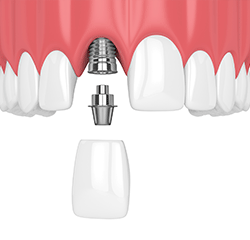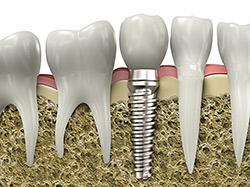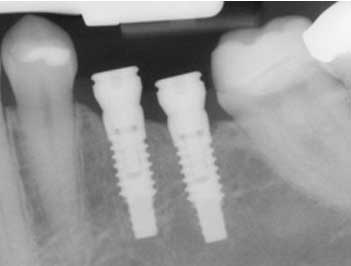 People are living longer than ever, and while regular brushing, flossing, and checkups allow many of us to maintain our natural smiles for a lifetime, sometimes our teeth just can’t keep up. If you’ve lost a tooth (or a few teeth) due to injury or disease, implant dentistry just might be the answer to rejuvenating both your smile and your oral health.
People are living longer than ever, and while regular brushing, flossing, and checkups allow many of us to maintain our natural smiles for a lifetime, sometimes our teeth just can’t keep up. If you’ve lost a tooth (or a few teeth) due to injury or disease, implant dentistry just might be the answer to rejuvenating both your smile and your oral health.
An implant is a synthetic tooth root in the shape of a post that is surgically placed into the jawbone. The “root” is usually made of titanium: the same material used in many replacement hips and knees, and a metal that is well-suited to pairing with human bone. A replacement tooth is then fixed to the post. The tooth can be either permanently attached or removable. Permanent teeth are more stable and feel more like natural teeth.
The ideal candidate for dental implants and implant dentistry is someone who is missing one or several teeth. Additionally, your dental implant success rate increases if you do not smoke and if you have good oral health, including a sufficient amount of bone in the jaw, and healthy gums with no sign of gum disease.
 Implants are versatile. If you are only missing one tooth, one implant plus one replacement tooth will do the trick. If you are missing several teeth in a row, a few strategically placed implants can support a permanent bridge (a set of replacement teeth). Similarly, if you have lost all of your teeth, a full bridge or full denture can be permanently fixed in your mouth with a well-planned number of implants.
Implants are versatile. If you are only missing one tooth, one implant plus one replacement tooth will do the trick. If you are missing several teeth in a row, a few strategically placed implants can support a permanent bridge (a set of replacement teeth). Similarly, if you have lost all of your teeth, a full bridge or full denture can be permanently fixed in your mouth with a well-planned number of implants.
Dental implants, dentures, and bridges can all be used to replace teeth, but how do you know which is the right choice for you? It ultimately depends on how many missing teeth you have, where they are located, and how healthy your mouth is around the open spaces where teeth are missing.
Dentures may be the best choice for those who have lost all or nearly all of their permanent teeth. However, if you have only a single tooth or even a couple of teeth missing, implants can save your remaining teeth while still providing you with a full smile.
Bridges can help fill the gaps of your missing teeth, but they rely on the teeth surrounding them. Often, gaps can cause gum and tooth decay, even to the teeth next to them. If the teeth around your missing teeth aren’t healthy or strong, implants are likely a better option.
 Conventional bridges and dentures are not fixed to the bone, and can therefore be unstable. This can make it difficult to eat or smile with confidence. Implants not only look more natural but feel and act more like normal teeth, with a stronger biting force. And because they don't directly rely on neighboring teeth for support, implants don't compromise the health of your natural teeth. In fact, bridges are only expected to last seven to ten years, even less with root canals, whereas implants will typically last a lifetime.
Conventional bridges and dentures are not fixed to the bone, and can therefore be unstable. This can make it difficult to eat or smile with confidence. Implants not only look more natural but feel and act more like normal teeth, with a stronger biting force. And because they don't directly rely on neighboring teeth for support, implants don't compromise the health of your natural teeth. In fact, bridges are only expected to last seven to ten years, even less with root canals, whereas implants will typically last a lifetime.
Immediately after your dental implant treatment, your mouth is more sensitive. To give your dental implants the best chance at success, your teeth cleaning habits will change for a short period after your procedure.
Avoid brushing for the following 24-hours after your treatment to ensure that everything is settled correctly and to help your gums begin to heal. Additionally, you’ll want to stay clear of drinking from a straw, using mouthwash, smoking, eating hot foods, and chewing gum. Any of these activities can cause your mouth to bleed and interfere with the healing process.
For everyday care, consider your replacement teeth to be the same as natural teeth. They require the same daily brushing and flossing, and the same amount of regular checkups. Just like your natural teeth, the better you take care of your replacements, the longer they will last.
At Kenmar Dental, we aim to give affordable dental care to all our patients. Each patient and their implant needs are different, so the cost will differ depending on the number of implants, condition, and the region in your mouth for the implants.
On average, a dental implant is about the same price as a regular bridge. The New York Times estimates that the typical price for a single dental implant is $3,000–$4,500. While this may appear to be over-the-top, implants are relatively permanent and promote better wellness for your mouth than a bridge or dentures. Dental implants are a worthwhile investment for your overall health if you’re looking for a cost-effective way to restore your smile long-term.
Additionally, most insurance companies will pay a portion of the procedure costs. The overall out-of-pocket cost for you will be determined by your insurance after you meet with our dentist and receive a personalized estimate.
Many patients are surprised by how well they feel after the procedure. Although surgeries put most people on edge about the expected pain, most patients feel very little pain during the process.
We offer local anesthesia during the surgery, which will numb the area being treated. We will not work on your implant until you are numb to ensure that you are not in pain. If you do feel anything during the procedure, you will likely feel pressure rather than pain.
After the procedure is complete and the anesthesia wears off, you may feel some discomfort. However, this is easily treated by a prescription from the dentist or by over-the-counter painkillers like ibuprofen and acetaminophen.
Since dental implants are a less painful procedure than other options, you can get back to most of your regular day-to-day activities by the next day. A diet that requires little chewing is recommended for the first two weeks after the surgery to prevent unnecessary pain.
For your mouth to completely recover from the surgery, expect to heal for about four or more months.
According to the American College of Prosthodontists, dental implant patients have a
90–95% success rate if they are healthy and practice good oral hygiene. The success will also depend on eating and drinking habits, regular dental checkups, and post-treatment care.
Bruising and swelling are fairly common side-effects after a dental implant surgery, according to the American Academy of Implant Dentistry. Additionally, some bleeding may occur, especially if there is any aggravation up to three days after the procedure.
While there are other risks associated with dental implants, they are not typical. If any other side-effects occur, such as tooth or nerve pain, contact your dentist to quickly remedy the issue.
While most people don’t tend to think about children as candidates for dental implants, they can be. If a child has lost a permanent tooth, then dental implants are a long-term choice for restoring their smile. However, because children are still growing, most dentists will not perform the dental implant procedure until the child is 16–18.
 Keep your teeth and gums healthy by filling the gap left by a missing tooth with a dental implant. With our dental implants that match your teeth, you’ll feel more comfortable and confident in your smile.
Keep your teeth and gums healthy by filling the gap left by a missing tooth with a dental implant. With our dental implants that match your teeth, you’ll feel more comfortable and confident in your smile.
Choose to work with Kenmar Dental for your implant dentistry needs in Marietta! Our staff is committed to giving you the best care possible for the lowest prices. We understand that your smile is something to be proud of, and we want to help you gain that pride.
Visit our office just off I-75 or contact us to learn more about dental implant options and how Kenmar Dental can help you with your dental needs today!